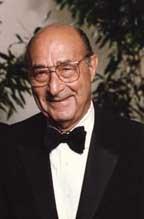Albert B. “Ollie” Adelman was a visionary, a leader, and a truly extraordinary man, according to Jewish community leaders who knew and worked with him.
As Jerry Benjamin, president of the Milwaukee Jewish Federation said, Adelman “was the last of the parents and [one of the] heroes of our community… Ollie was persuasive, and he had a strong belief in Israel and the Jewish people.”
According to Richard H. Meyer, former executive vice president of the Milwaukee Jewish Federation, Adelman was “one of the first leaders to model the use of true major donors for sustained, major fundraising. He was one of the first [leaders] to be direct and open about expectations for people and the community.”
“He was one of those rare people that never lost his passion, verve and commitment to Jewish life,” Meyer continued. “He never stopped caring.”
Adelman, who died on Jan. 13 at 96, played a long list of roles in the Jewish community. He was a president of the Milwaukee Jewish Welfare Fund, and was instrumental in the changing of its name to the Milwaukee Jewish Federation.
He served as Wisconsin and national chair of State of Israel Bonds, was one of the original members of the board of governors of the reconstituted Jewish Agency for Israel and later chaired JAFI’s absorption committee, and was a national chair of the old United Jewish Appeal.
He was a founding member of Brynwood Country Club, which was the only private Jewish club in the area, and he felt that members should contribute as much to a charity as they paid in dues. He served on the board of directors and as president of the club in the early 1950s.
Adelman also was the driving force behind construction of the Helfaer Community Service Building (completed in 1973), which houses the MJF and other agencies.
He also through personal meetings and telephone calls got then-world renowned architect Edward Durrell Stone to design the building, and arranged the commissioning of the tapestry designed by world-renowned artist Marc Chagall and woven by Yvette Cauquil-Prince to put in the building’s atrium.
According to documents in the Jewish Museum Milwaukee Archive, Adelman also served on the boards of Haifa University, the Jewish Telegraphic Agency, the American Israel Public Affairs Committee, and the American Jewish Joint Distribution Committee.
In his 2004 autobiography “All Things Are Possible” (written with assistance of Kurt Chandler), Adelman wrote that he participated in some 30 missions to Israel in various capacities.
Following his father
He also wrote that he followed in his father’s footsteps — “the basic philosophy of living my life was becoming part of me through the way my father conducted himself.”
He wrote that his father, Ben Adelman, had emigrated from Russia with practically nothing, and had demonstrated that through hard work, initiative, and determination, one could build a better life. In addition, “From my father, I learned to be persistent at an early age,” he wrote.
Ollie (he wrote that he acquired that nickname from the kids in his second grade class) became an athlete, excelling especially in football and tennis. After graduating from Shorewood High School, he earned entrance into Northwestern University.
He excelled in academics and athletics — he was an All-American halfback — while teaching at a synagogue and serving as president of the campus Hillel. His athletic achievements and interest led to his becoming one of the first four Wisconsin Jewish athletes inscribed in the Jewish Community Center’s Athletic Wall of Fame in 1968.
He returned to Milwaukee with the intention of spending only one year assisting his father in the family dry cleaning business. Instead, he decided to remain.
Ollie became president of Adelman Laundry and created what he said was the largest dry cleaning and laundry business in the country. Later, he worked with his son Craig at Adelman Travel Group.
In his autobiography, Adelman repeatedly wrote that his athletic training and experience informed his life. For example:
• “The drive and determination that brought so many victories on the athletic field at Northwestern could also apply to advertising.”
• “In sports I had learned that there was a time to act quickly and dramatically.”
• “Never go into a game underestimating your opponent, and be sure your scouting report is complete and studied in advance.”
He was renowned for persistence in personal as well as community matters. He prevailed upon the famous architect Frank Lloyd Wright to design a house for him and his family. It was built in Fox Point in 1948.
He also wrote that he spent most of his young manhood building his business and his family — he married Edie Margoles in 1938, and they had three sons by 1944. But when Israel became a state in 1948, “my involvement in the Milwaukee Jewish community began to seriously stir.”
His wife died in 2007. He is survived by sons Lynn (Betty) Adelman, Gary (Linda) Adelman, and Craig Adelman; sister Lucille Feenberg; three grandchildren; and eight great-grandchildren.
Blane Goodman Funeral Service handled arrangements. A memorial service was held Jan. 15 at Congregation Sinai. Burial was in Greenwood Cemetery.
Diana Kahn is a Milwaukee educator and freelance writer.


